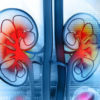Prostate Cancer Treatment in Northern New Jersey
 Prostate cancer is the second most common cancer in American men, behind skin cancer. Fortunately, treatment options are available for men diagnosed with prostate cancer. Bergen Medical Associates is a multi-specialty medical provider serving patients in northern New Jersey with high-quality medical services, including urology care and prostate cancer treatment. Learn more about prostate cancer, the stages, and the possible treatments available from Bergen Medical Associates.
Prostate cancer is the second most common cancer in American men, behind skin cancer. Fortunately, treatment options are available for men diagnosed with prostate cancer. Bergen Medical Associates is a multi-specialty medical provider serving patients in northern New Jersey with high-quality medical services, including urology care and prostate cancer treatment. Learn more about prostate cancer, the stages, and the possible treatments available from Bergen Medical Associates.
What Is Prostate Cancer?
The prostate is a small gland in the male reproductive system that helps produce the fluid in semen. Prostate cancer occurs when the cells in this gland start to grow out of control. Prostate cancer may spread to other parts of the body (metastatic) or remain within the prostate tissue (localized). Prostate cancer tends to grow slowly, but it can grow quickly in some cases.
Patients with early stages of prostate cancer may not experience any noticeable signs or symptoms. Patients with more advanced stages may experience signs and symptoms such as:
- Frequent urination
- Trouble urinating
- Slower or less forceful urine stream
- Erectile dysfunction (ED)
- Blood in urine or semen
- Loss of bladder or bowel control
- Unintentional weight loss
- Bone pain
These symptoms can be caused by other diseases or disorders, so an accurate diagnosis is crucial. Patients should consult their doctor for testing if they consistently notice these symptoms.
What Are the Causes and Risk Factors of Prostate Cancer?
Prostate cancer starts with initially healthy cells that grow uncontrollably due to changes in their DNA. These cells grow and divide rapidly and behave abnormally. As these abnormal cells persist, healthy cells die. Over time, abnormal cells can amass into a tumor that impacts the surrounding tissue.
No single cause for prostate cancer is known, but research has shown certain risk factors can increase a man’s likelihood of developing it. These risk factors include:
- Age: The risk of developing prostate cancer significantly increases after a man turns 50, with the median age of a prostate cancer diagnosis being 67 years old.
- Genetics/family history: Men who have inherited gene changes or who have a close relative with prostate cancer have an increased chance of getting it.
- Ethnicity: Men who are of Caribbean or African descent are more likely to get prostate cancer than Caucasian men, while Latino men are less likely to develop prostate cancer.
Other factors that may increase a person’s risk for prostate cancer include smoking, being overweight or obese, or being exposed to certain chemicals.
How Is Prostate Cancer Diagnosed?
Prostate cancer screening and testing are not recommended for every man. For those with symptoms, a family history of the disease, or those who are between 45 and 69 years old, screening is recommended. The screening process involves various steps to either confirm or rule out a prostate cancer diagnosis, including:
- Blood tests: One blood test measures the prostate-specific antigen (PSA) level in the patient’s blood.
- Digital rectal exam (DRE): This physical exam involves the doctor inserting a lubricated and gloved finger into the patient’s rectum to feel the prostate. An enlarged prostate may indicate prostate cancer.
- Prostate biopsy: This involves taking a sample of tissue from the prostate to look for cancer cells under a microscope.
These tests are often used together to confirm a diagnosis and give the medical team insight into the stage of the cancer, the best treatment option, and whether treatment is working. If cancerous cells are found in a prostate biopsy, they are inspected by a specialist who will give the cancer a stage.
What Are the Stages of Prostate Cancer?
The stage of prostate cancer describes where the cancer is in the prostate, how extensive it is, and whether it has spread to other parts of the body. Doctors use the Tumor, Nodes, and Metastasis (TNM) system for tumor staging. Each letter represents a feature of the cancer (T for whether the tumor is growing, N for whether the tumor has spread to surrounding lymph nodes, and M for whether the tumor has metastasized to other areas. The following are the four main stages of prostate cancer:
- Stage I: The cancer is growing slowly, but the tumor cannot be felt during a DRE or seen during imaging.
- Stage II: The tumor can be seen on imaging and felt during a DRE but has not spread outside the prostate.
- Stage III: The tumor grows outside the prostate to surrounding lymph nodes or the seminal vesicles.
- Stage IV: The tumor has spread further to other areas of the body such as the bladder, rectum, or pelvic wall.
The stage of the patient’s prostate cancer will affect which treatment options are available and recommended for the best chances of remission.
What Are the Treatments for Prostate Cancer?
When a patient is diagnosed with prostate cancer and is given a stage, their medical team will determine the most suitable treatment for their case. Treatment options for prostate cancer include:
Active Surveillance
Active surveillance is for patients with lower stages of prostate cancer. It involves monitoring the patient’s test results and biopsies over time to see if the cancer is spreading or staying the same. If surveillance shows changes, the patient can start further treatment.
Surgery
Surgery is often a successful treatment option for prostate cancers that have not spread. Called a radical prostatectomy, this surgical procedure removes the prostate gland with the cancer cells, either through an open incision or with robotic tools.
Radiation Therapy
Radiation therapy, which kills cancer cells while preserving surrounding healthy cells, is another treatment option for prostate cancer. It can treat early-stage prostate cancer and more advanced stages that have metastasized.
Some patients can benefit from systemic therapy treatments if their cancer has spread outside the prostate. These include hormone therapy, chemotherapy, immunotherapy, and targeted therapy.
Learn More About Prostate Cancer Treatment Today
Patients with prostate cancer can find high-quality care at Bergen Medical Associates. Serving patients at multiple northern New Jersey office locations, Bergen Medical Associates has established a trusted reputation for providing comprehensive and compassionate care. To learn more about the prostate cancer treatment options at Bergen Medical Associates, request an appointment today.










